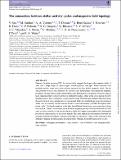Files in this item
The connection between stellar activity cycles and magnetic field topology
Item metadata
| dc.contributor.author | See, V. | |
| dc.contributor.author | Jardine, M. | |
| dc.contributor.author | Vidotto, A. A. | |
| dc.contributor.author | Donati, J.-F. | |
| dc.contributor.author | Boro Saikia, S. | |
| dc.contributor.author | Bouvier, J. | |
| dc.contributor.author | Fares, R. | |
| dc.contributor.author | Folsom, C. P. | |
| dc.contributor.author | Gregory, S. G. | |
| dc.contributor.author | Hussain, G. | |
| dc.contributor.author | Jeffers, S. V. | |
| dc.contributor.author | Marsden, S. C. | |
| dc.contributor.author | Morin, J. | |
| dc.contributor.author | Moutou, C. | |
| dc.contributor.author | do Nascimento Jr., J. D. | |
| dc.contributor.author | Petit, P. | |
| dc.contributor.author | Waite, I. A. | |
| dc.date.accessioned | 2016-11-17T11:30:13Z | |
| dc.date.available | 2016-11-17T11:30:13Z | |
| dc.date.issued | 2016-11-11 | |
| dc.identifier | 247676576 | |
| dc.identifier | 9dc7f5b9-dd92-4de2-bb5c-ca1da6071f0c | |
| dc.identifier | 84994493539 | |
| dc.identifier | 000385231600071 | |
| dc.identifier.citation | See , V , Jardine , M , Vidotto , A A , Donati , J-F , Boro Saikia , S , Bouvier , J , Fares , R , Folsom , C P , Gregory , S G , Hussain , G , Jeffers , S V , Marsden , S C , Morin , J , Moutou , C , do Nascimento Jr. , J D , Petit , P & Waite , I A 2016 , ' The connection between stellar activity cycles and magnetic field topology ' , Monthly Notices of the Royal Astronomical Society , vol. 462 , no. 4 , pp. 4442-4450 . https://doi.org/10.1093/mnras/stw2010 | en |
| dc.identifier.issn | 0035-8711 | |
| dc.identifier.other | BibCode: 2016MNRAS.462.4442S | |
| dc.identifier.other | ORCID: /0000-0002-1466-5236/work/57821870 | |
| dc.identifier.uri | https://hdl.handle.net/10023/9831 | |
| dc.description.abstract | Zeeman–Doppler imaging (ZDI) has successfully mapped the large-scale magnetic fields of stars over a large range of spectral types, rotation periods and ages. When observed over multiple epochs, some stars show polarity reversals in their global magnetic fields. On the Sun, polarity reversals are a feature of its activity cycle. In this paper, we examine the magnetic properties of stars with existing chromospherically determined cycle periods. Previous authors have suggested that cycle periods lie on multiple branches, either in the cycle period–Rossby number plane or the cycle period–rotation period plane. We find some evidence that stars along the active branch show significant average toroidal fields that exhibit large temporal variations while stars exclusively on the inactive branch remain dominantly poloidal throughout their entire cycle. This lends credence to the idea that different shear layers are in operation along each branch. There is also evidence that the short magnetic polarity switches observed on some stars are characteristic of the inactive branch while the longer chromospherically determined periods are characteristic of the active branch. This may explain the discrepancy between the magnetic and chromospheric cycle periods found on some stars. These results represent a first attempt at linking global magnetic field properties obtained from ZDI and activity cycles. | |
| dc.format.extent | 9 | |
| dc.format.extent | 405406 | |
| dc.language.iso | eng | |
| dc.relation.ispartof | Monthly Notices of the Royal Astronomical Society | en |
| dc.subject | Techniques: polarimetric | en |
| dc.subject | Stars: activity | en |
| dc.subject | Stars: evolution | en |
| dc.subject | Stars: magnetic field | en |
| dc.subject | Stars: rotation | en |
| dc.subject | QB Astronomy | en |
| dc.subject | QC Physics | en |
| dc.subject | NDAS | en |
| dc.subject | BDC | en |
| dc.subject.lcc | QB | en |
| dc.subject.lcc | QC | en |
| dc.title | The connection between stellar activity cycles and magnetic field topology | en |
| dc.type | Journal article | en |
| dc.contributor.sponsor | Science & Technology Facilities Council | en |
| dc.contributor.sponsor | Science & Technology Facilities Council | en |
| dc.contributor.institution | University of St Andrews. School of Physics and Astronomy | en |
| dc.identifier.doi | https://doi.org/10.1093/mnras/stw2010 | |
| dc.description.status | Peer reviewed | en |
| dc.identifier.url | https://arxiv.org/abs/1610.03737 | en |
| dc.identifier.grantnumber | ST/J003255/1 | en |
| dc.identifier.grantnumber | ST/M001296/1 | en |
This item appears in the following Collection(s)
Items in the St Andrews Research Repository are protected by copyright, with all rights reserved, unless otherwise indicated.

